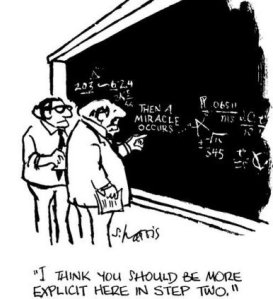I’ve always been interested in psychology. I love how it explains the way people think and act, making it easier for us to predict and control future behaviors to better people’s lives. But among all the subjects discussed in psychology, learning theories have always been closest to my heart. They give teachers and students the chance to refine their approach to learning, thus fulfilling their ultimate goal of understanding the world around them.
On Intelligence, Motivation, Teaching, and Learning

Photo credit: http://seekingtounderstandausefultruth.blogspot.com
Before I took this course, I already had pre-conceptions about human learning. I considered it as an active process wherein individuals construct their own knowledge of the world, and I believed that it is the teacher’s responsibility to help students become self-motivated learners.
Behaviorism and cognitivism, two of the major theories discussed in this class, doesn’t view students as active agents of learning. They see students as empty vessels waiting to be filled, as sponges waiting to absorb new information. It was only when the class discussed constructivism that my old beliefs about teaching were affirmed. Constructivists also made me realize that a democratic, student-centered classroom will best teach students how to learn and help them become independent learners.
Humanism is also one of the theories that changed by prior beliefs about learning. While I never really liked teachers who were overly strict, I tended to justify their actions because I thought that they just had a different approach to disciplining students. But after reading Carl Rogers’ theory on facilitative teaching, I came to realize that students will learn better if they are treated as “people first and learners second” (Juachon, 2012).
Bandura’s theories about motivation also gave me a clearer idea of what kind of teacher I should be in the future. I now know that students will have a bigger chance of succeeding in their careers once they have developed the desire to learn for learning’s sake. In line with behaviorism, I’ve realized the importance of using positive reinforcements (tangible rewards, praises) to motivate students. I’ve never been an advocate of punishments, so I was also glad to know that the using positive reinforcements properly would be more effective than administering punishments.
My previous beliefs about intelligence have also changed. Though I was already familiar of Howard Gardner’s Multiple Intelligences Theory, I had a certain bias on the types of intelligence he proposed. I initially believed that people with high levels of verbal-linguistic and mathematical-logical are more superior to those who have high visual-spatial, bodily-kinesthetic, interpersonal, intrapersonal, naturalistic, or musical intelligences.
But after learning more about this theory, I’ve come to realize that all students possess varying levels of these intelligences so it will be best to tap and improve each instead of merely focusing on verbal-linguistic and mathematical-logical intelligences.
Am I Evolving into a Better Learner?

Photo credit: http://m-phi.blogspot.com
Through this course, I was able to improve my approach to learning. I have learned to use metacognition to my advantage by setting my own goals, evaluating whether I’ve reached my goals or not, and finding ways to improve the methods I use as I try to understand concepts that were once foreign to me.
I have also become more aware of my learning preferences, and I’ve realized the importance of going beyond the usual techniques I use. Instead of simply capitalizing on my strengths as a verbal, aural learner, I’ve tried to explore other learning strategies to make sure that I can efficiently process information regardless of how it was presented to me.
Now that I’ve become a better learner and more importantly, a better thinker, I know that I’ll exert a positive influence over my students. Once my students have noticed how motivated I am to learn new things, there’s a big chance that they would model my behavior and feel the same way about learning.
I’ve also formulated best practices for teaching that will guide me once I’ve become a licensed teacher. I’m ready to create a democratic and stimulating learning environment for students by using a combination of all the theories I’ve learned in this class. I will also focus more on helping my students become independent learners, which will eventually turn them into critical thinkers who possess the incessant urge to find out more about the world around them.
I’m glad that I took this course. Without it, I wouldn’t have changed my former beliefs about learning and contextualized how theories affect our teaching pedagogies, whether consciously or unconsciously.
It’s great, but if your students have no incentive to work harder at all… there is nothing you can do ((
Hello what a brilliant blog!, So i was wondering, are you studying psychology at university? I am a sixthform student and i’m really loving psychology! (thinking of taking it to a higher level)
Well said!
I agree that we have learned a lot from this course. We are all enlightened on how to be facilitators and guides of our students or future students to become lifelong learners. This subject influenced our thoughts and beliefs from traditional to dynamic approach in teaching and learning.
Hope to apply our new learning in the future.
Monette:)
This course has really inspired us to think out of the box and understand beyond our comfort zones. Of course, it is still not easy to create lesson plans after this class, but at least we have the different theories to aid us in creating a worthy learning experience.